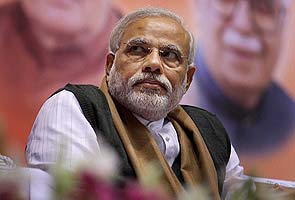 New Delhi, Aug 17: Gujarat chief minister Narendra Modi’s Independence Day attack on Prime Minister Manmohan Singh continued to generate heat on Friday, with UPA ministers and Congress leaders attacking him sharply for hitting out at the Prime Minister on Independence Day and the BJP springing to his defence.
New Delhi, Aug 17: Gujarat chief minister Narendra Modi’s Independence Day attack on Prime Minister Manmohan Singh continued to generate heat on Friday, with UPA ministers and Congress leaders attacking him sharply for hitting out at the Prime Minister on Independence Day and the BJP springing to his defence.
External affairs minister Salman Khurshid said in Uttarakhand, "What should I say about Modi? He is like a frog just out of the well and at a loss to find the right place for himself in the big wide world."
Reacting to Khurshid, BJP spokesperson Nirmala Sitharaman questioned the use of non-diplomatic language in criticism, recalling that terms like frog, monkey, snake, and maut ka saudagar have been used in the past.
She also defended Modi’s attack on the PM on Independence Day, saying the Congress could not question the timing of the attack at a time when the economy was deteriorating and the rupee was falling.
Minister for information and broadcasting Manish Tewari dubbed Modi’s attempt to compete with the PM as “crass” and “cheap”.
“The Prime Minister addresses the nation from the Red Fort as a symbol of faith and aspiration of 120-crore people. If one thinks that he can compare himself from the Prime Minister’s address made from the Red Fort, then nothing can be more ridiculous than this,” Tewari said.
“This is a very crass and cheap attempt on which we would not like to make any comment.”
Congress leader Digvijaya Singh used BJP patriarch LK Advani’s tacit disapproval of Modi’s speech a day back to hit out at the Gujarat CM. "On Modi's Independence (Day) Speech, I and Advani ji are on the same page. Modi's abrasive hunger for power has no limits," Singh wrote on microblogging site Twitter.
Advani had reacted to Modi’s attack on the Prime Minister on Thursday saying: “Today on Independence Day, without criticising anybody, we all should realise that India has unlimited potential for the future.” Shiv Sena leader Sanjay Raut had also agreed with the patriarch.
However, the BJP tried to brush aside Advani’s tacit criticism of Modi. "There is no conflict of interest at all because Advaniji has not taken any name. It is very clear that Prime Minister Manmohan Singh is answerable to the nation. He has failed, therefore we have every right to question him. But no personal criticism should be made," senior BJP leader Venkaiah Naidu said in Kolkata.
"But yes, there can be criticism of his performance. The Prime Minister is accountable to the nation."
In Delhi, Sitharaman said the BJP took everything said by Advani seriously and introspected on it, while underlining that the national economy was the prime concern.
Union minister Anand Sharma termed Gujarat chief minister Narendra Modi as a "national embarrassment".
Sharma said that as per social indices, Gujarat has the highest school dropout rate, high malnutrition deaths compared to other states and low availability of safe drinking water.





Comments
Add new comment